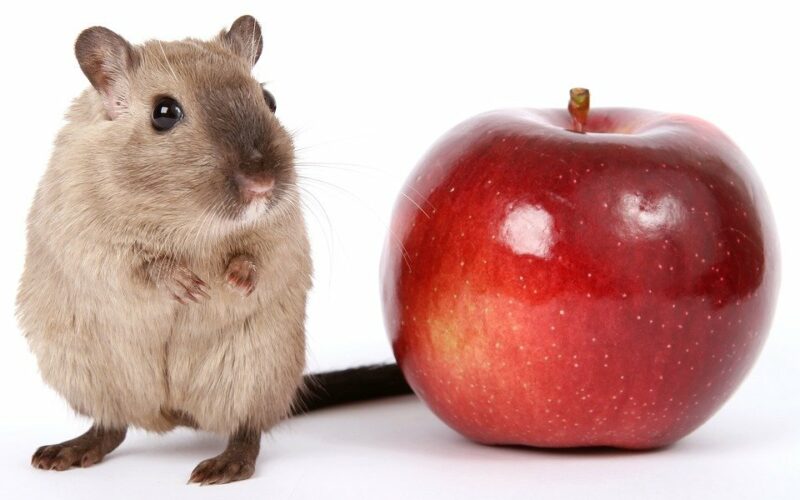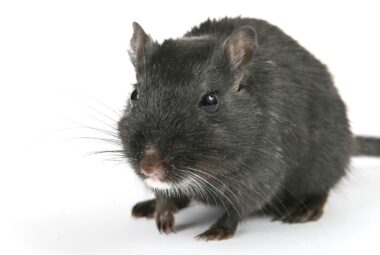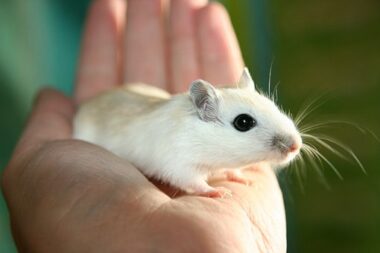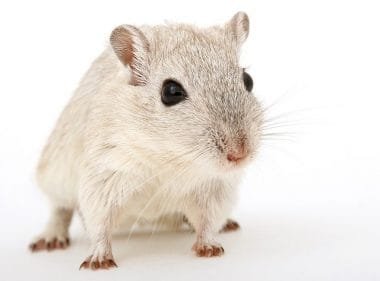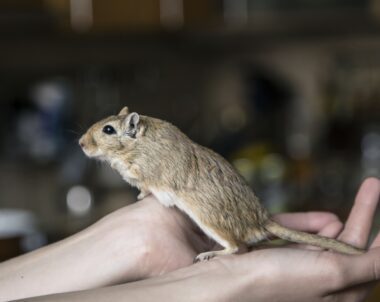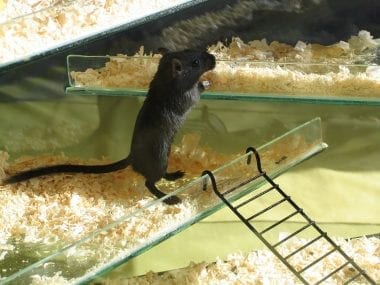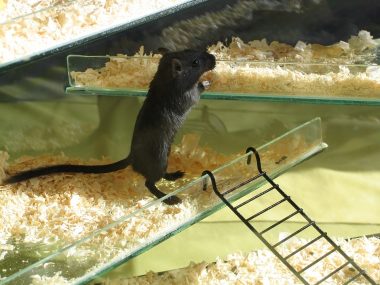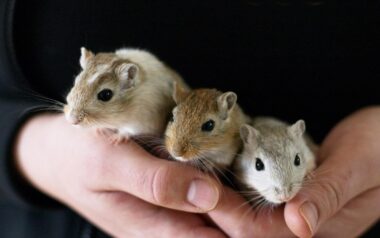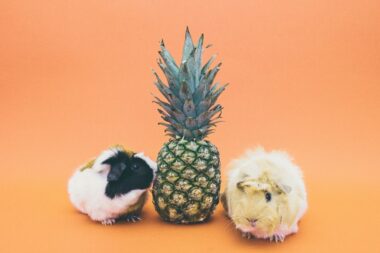A gerbil may be small in size, but it has a huge personality. They are very popular pets since they are relatively inexpensive and easy to care for. Their diet is quite simple and their housing setup is easy to maintain. They are curious, playful and active animals, but also make very quiet pets. They are very clean creatures and constantly groom themselves.
Globally, gerbils can be found in several sizes. There are about 100 known species of gerbils, and they are primarily native to India, Asia and Africa. In terms of gerbil size, they are small rodents weighing between 2 and 4 ounces. The males are typically larger than the females. A gerbil size is somewhere between a mouse and a rat.
What is a gerbil’s size on average?
A gerbil can range from under 2 inches (ca. 5 cm) to over 8 inches (ca. 20 cm) in length, not including their tails. Mongolian gerbils make the most popular pets and are usually medium in size. At birth, these gerbils are less than 3 grams in weight. As they grow, they weigh about 90 grams on average. A Mongolian gerbil is about 4 inches (ca. 10 cm) long, with the tail usually being as long as their body.
The fat-tailed gerbils also are popular choices for pets. The gerbil size is about the same as the Mongolian gerbils, but their tails are shorter by about 2 inches (ca. 5 cm). Their weight is also lesser by about 40 grams.
The constant phenomenon through all the species is that the males are larger than the females in terms of gerbil size. They’re born at the same size, but they do increase in size as they get older, typically through sexual maturity.
There are a few main types of gerbil breeds. Keep reading for the assessment of their gerbil sizes.
1) Mongolian Gerbils
A Mongolian gerbil is the most common type of pet gerbil. These gerbils are about 4 inches (ca. 10 cm) to 6 inches (ca. 15 cm) in length, from their nose to the base of their tail.
2) Fat-tailed Gerbils
The fat-tailed gerbil grows up to 4 inches (ca. 10 cm), from its nose to the base of its tail. Their unique feature is their tail width. The tail is only about 2 inches (ca. 5 cm) long. However, it is very thick and is shaped like a club. The fat-tailed gerbil uses the tail to store water and fat.
3) Pallid Gerbils
They have a very similar size to that of the Mongolian gerbil. However, they have shorter bodies and longer tails. They weigh anywhere between 26 grams to 49 grams.
4) Great Gerbils
As the name indicates, the great gerbil is the largest gerbil in terms of gerbil size. It is about 5.9 inches (ca. 15 cm) to 7.9 inches (ca. 20 cm) long, with a comparatively shorter and densely hairy tail.
5) Shaw’s Jirds
Jirds are larger in size, as compared to the Mongolian gerbil. The males can reach up to 14 inches (ca. 36 cm) (including the tail).
6) Indian gerbil
This gerbil measures only 2 inches (ca. 5 cm) in length and is known for its tendency of being a nasty biter.
7) Egyptian gerbil
This gerbil is smaller in terms of size, as compared to the Mongolian gerbil. It grows to only about 3 inches (ca. 8 cm) in length. Its body resembles that of a rat since it is compact and slender.

What is the size difference between male and female gerbils?
Male gerbils usually tend to grow much larger than females. Male gerbils can grow up to anywhere between 80 and 135 grams. The size difference can be attributed to the contrasting roles of males and females in the clan. The largest male is the most dominant gerbil, and he gets the first pick of food, living space and sleep. He continues to pass his genes to the next generation. Over time, through natural selection, male gerbils have a tendency to be bigger in size than female gerbils. On the other hand, females have no need to grow large in size, as the female gerbil’s job is to rear the young. Size does not impact that ability. However, female gerbils do get larger during pregnancy. They tend to gain a few grams per day during this period.
What is the biggest gerbil size?
In terms of setting a world record, there is none for the largest domestic gerbil. However, the largest gerbil species in the world is the Great Gerbil. Their length is about the same as a guinea pig, and they are about 6 inches (ca. 15 cm) to 8 inches (ca. 20 cm) in length.
What is the smallest gerbil size?
Gerbils are typically small animals. Out of the numerous species of gerbils, the pygmy gerbil is a tiny species. The smaller gerbil size is that of the pouched gerbil, with about 3 inches (ca. 8 cm) in length. They are rarely more than 14 grams in weight.
In terms of domesticated gerbils, the smallest gerbil size would be that of a fat-tailed gerbil. They are not much smaller than the Mongolian gerbils in terms of size, but they’re lighter. They weigh only about 40 grams.
What is the relationship between the gerbil’s age and its size?
A newly born gerbil is average to be only half an inch long in size and only 3 grams in weight. It begins to grow in size at 1 week, and between 6 months to 1 year, attains its full size.
What are the factors that can affect the gerbil size?
The gerbil size can be affected by several factors. Some of them are listed below.
- The gender of the gerbil affects the gerbil size. The male gerbils are typically larger than the female gerbils.
- Like all species, genetics play a huge role in the ultimate gerbil size. Gerbils can be naturally inclined to grow bigger or smaller.
- Diet has a role to play in determining the ultimate gerbil size. If a gerbil is eating a high-calorie diet, which is rich in vitamins and minerals, it should grow larger than other gerbils.
- In the case of non-domesticated gerbils, the dominant gerbil in the clan tends to grow larger than the others. This is usually because the dominant gerbil gets the first pick of all the food.
How to understand if a gerbil size is abnormal?
Regarding pet gerbils, there might be concerns regarding the weight of the gerbil. Being overweight is unhealthy for the gerbil.
If the gerbil is getting heavier and wider but is not getting longer, chances are that the gerbil is getting overweight. Gerbils are not supposed to weigh more than approximately 110 grams for females and 135 grams for males. The weight reference of smaller gerbils is affected according to their frame. If the gerbil looks chubby and is sedentary, chances are that is it overweight. Do not put the gerbil on a diet without seeking professional advice. It could adversely harm the animal since it is very possible that the gerbil just has an extra heavy skeleton.
When do gerbils stop growing in size?
In plain terms, gerbils stop growing once they attain adulthood. However, since there is no exact moment where a gerbil attains adulthood, there is no precise moment where they stop growing.
Gerbils have their growth spurts, like humans, around the time they are about to attain sexual maturity. This phenomenon is at about 3 months. Most gerbils attain their full size at about 6 months. But some gerbils continue to grow until they’re 1 year old. This is heavily impacted by variable factors like genetics and diet.
Can there be an increase in the size of a gerbil after it has fully grown?
There are other factors that may affect a fully grown gerbil’s size.
- Pregnancy is a phenomenon that will cause a female gerbil to grow in size.
- Tumours are unfortunately quite common in gerbils. Tumours inside the stomach can make it appear as if the gerbil has increased in size.
- Obesity and a sedentary lifestyle can cause an unhealthy weight gain and increase in size.
That is just about all you need to know about gerbil sizes.
Gerbils are extremely cute animals. However, they require proper attention to be given towards their housing, food, temperature and exercise. Owing to their small size, they need to be handled very gently and with care. Therefore, contrary to popular belief, they do not make good “starter” pets for children. Before deciding to bring gerbils into the home, proper research must be conducted regarding their requirements and needs. If and when there is full confidence that their needs can be fully taken care of, only then should the delicate creatures be brought into the home.
